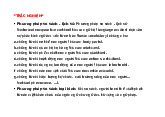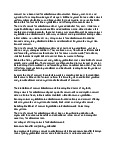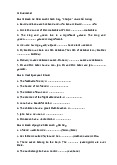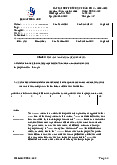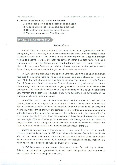









Preview text:
Nội dung ôn tập môn Ngữ nghĩa học Tiếng Anh
A. Học thuộc các định nghĩa
1. Semantic field & semantic feature 2. Reference & referent
3. Denotative & Connotative meaning 4. Figures of speech
5. Sentences, utterances and propositions 6. Antonym & synonym 7. Homonymy, polysemy 8. Ambiguity 9. Paraphrase B. Bài tập
I. Exercise: Identify the semantic features in each of the following words.
1. Child: [+human], [−mature], [±male], [+innocent]1
2. Aunt: [+human], [±mature], [+female], [+father’s/mother’s sister (-in-law)]
3. Hen: [+animate], [+bird], [+fowl], [+fully grown], [+female]
4. Oak (-tree): [+plant], [+deciduous tree], [+tough hard wood]
5. Flower: [+part of a plant], [+colored], [+usually good-smelling], [+bloom/blossom], [+fruit or seed is developed]
6a. Palm: [+part of a hand], [+inner surface], [+between the wrist and the fingers]
6b. Palm (-tree): [+plant], [+tree] [−branches] [+a mass of large wide leaves at the top], [+in warm or tropical climates]
7. Bachelor: [+human], [+mature], [+male], [+stay single]2
8. Actress: [+human], [+female], [+professionally artistic], [+perform a role]
9. Plod: [+motion], [+walk], [+slowly and laboriously]
10. Ewe: [+animate], [+sheep], [+fully grown], [+female], [+producing wool and meat]
11a. Fly: [+motion], [+through air or space], [+fast], [+wings or a means of transport]
11b. Fly: [+animate], [+insect], [+two wings], [+in and around houses]
12. Stallion: [+animate], [+horse], [+fully grown], [+male], [+for breeding]
13. Police-officer: [+human], [±male], [+member of the police force], [+disciplined]
14. Beauty: [+attractive feature], [+combination of shape, color, behavior, etc.], [+giving pleasure to senses]
15. Imagine: [+mental state], [+form a concept or an image], [+thoughtfulness]
16. Doe: [+animate], [+deer, reindeer, rabbit or hare], [+fully grown], [+female]
17. Drive: [+motion], [+operate/direct], [+related to a vehicle]
18. Home: [+thing], [+place for human habitation], [+closely related to a family or its life]
19. Elm: [+plant], [+deciduous tree], [+large rough-edged leaves], [+tough hard wood]
20. Chalk: [+thing], [+limestone], [+soft], [+white or colored], [+for writing or drawing]
21. Rose: [+plant], [+bush/shrub], [+sweet-smelling flowers], [+different colors, usually pinkish
or red], [+thorns], [+symbol for love]
22. Chick: [+animate], [+bird], [+fowl], [−fully grown], [±male]
23. Pap: [+thing], [+food], [+soft or semi-liquid], [+for babies or invalids]
24. Tiptoe: [+motion], [+walk], [+on toes], [+silently]
25. Pine(-tree): [+plant], [+evergreen tree], [+needle-shaped leaves], [+pale soft wood]
26. Owe: [+state], [+be in debt], [+obligation/duty], [+pay/repay]
27. Computer: [+thing], [+electric/electronic device], [+storing/processing data], [+making
calculations], [+controlling machinery]
28. Honesty: [+abstract notion], [+virtue], [+trustfulness], [+hard to evaluate]
29. Maid: [+human], [+mature], [+female], [+servant]
30. Spinster: [+human], [+mature], [+female], [+stay single]
II. Do Exercise 8: Interpret the meaning the following sentences and state what kind of figures
of speech (also called figurative language) used in each of them. (Trang 48 – 56 sách TMT)
1. When he gets going, Jack is a streak of lightning. Jack is a streak of lightning is a metaphor
which means Jack is very fast.
2. I found the fifty-two pounds of books you left for me to carry. Your kindness really moved me.
Your kindness really moved me is an expression of irony which means you were not kind to me at all.
3. The man is a demon for work.
The man is a demon for work is a metaphor which means the man is an energetic person who works very hard.
4. When you take that course, plan to study thirty hours a day. Study thirty hours a day is an
overstatement/a hyperbole which means study for a long time every day.
5. The wind howled angrily around the house all night. The wind is [−animate] and/or [−human]
while howled angrily is [+animate] and/or [+human]. Therefore, howled angrily is an expression
of personification which means blew strongly.
6. When the White House called, the ambassador went at once. The White House, which is
[+sign], is a metonymy meaning the US President, which is [+person].
7. My dormitory room is like a cave. My dormitory room is like a cave is a simile which means
my dormitory room is small and uncomfortable. In this case, my dormitory room is explicitly compared to a cave.
8. Come to the dormitory and see what a cave I live in. A cave is a metaphor which means a
small and uncomfortable room. In this case, my dormitory room is implicitly compared to a cave.
9. Dick was fairly pleased when he won the brand-new car in the contest. Fairly pleased is an
ironical understatement which means very pleased.
10. If you are not happy with the service, go and talk to the City Hall. The City Hall, which is
[+sign], is a metonymy meaning the city’s Mayor, which is [+person].
11. Man does not live by bread alone.
Bread, which is [+part], is a synecdoche which means necessaries or things needed for living, which is [+whole].
12. We now live under the same roof. Roof is [+part] while house is [+whole]. Therefore, live
under the same roof is a synecdoche which means live in the same house.
13. Albert was as sharp as a tack this morning. He answered every question as soon as it was
asked. Albert was as sharp as a tack is a simile which means Albert was quick-minded.
14. The river ate the bank away. The river is [−animate] and/or [−human] while ate away is
[+animate] and/or [+human]. Therefore, ate the bank away is an expression of personification
which means eroded the bank or gradually destroyed the bank.
15. Keep overeating like that and pretty soon you’ll weigh a thousand pounds. Weigh a thousand
pounds is an overstatement/a hyperbole which means be too heavy or get too fat. 16. After she
heard the good news, she grinned like a mule eating briars. Grinned like a mule eating briars is a
simile which means smiled broadly.
17. The captain was in charge of one hundred horses. Horses, which is [+instrument], is a
metonymy which means cavalries or soldiers fighting on horseback, which is [+agent].
18. Joe cried a little when he lost the thousand dollars. Cried a little is an ironical understatement which means cried a lot.
19. You can depend on Gina; she is a rock when trouble comes.
She is a rock is a metaphor which means she is strong-minded or she has strong nerves.
20. Life is a dream. There may be two possible ways to interpret this sentence: Life is a dream is
a metaphor which means life is short or life passes quickly. Life is a dream is a metaphor which
means life is as beautiful as a dream.
21. He’s so hardheaded that he won’t listen to anyone. Hardheaded is an idiom/a dead metaphor
which means obstinate or stubborn.
22. Research says that these methods are best. There may be two possible ways to interpret this
sentence: • The first way: Research is [−animate] and/or [−human] while says is [+animate]
and/or [+human]. Therefore, the whole sentence is an expression of personification which means
researchers say that these methods are best. • The second way: Research, which is [+controlled],
stands for/substitutes for researchers, which is [+controller]. This is a metonymy. The whole
sentence means researchers say that these methods are best.
23. Right at this minute, I could drink a barrel of water without stopping. A barrel of water is an
overstatement/a hyperbole which means a lot of water.
24. It is amazing what a great mind he is. A great mind, which is [+part], stands for/substitutes
for an erudite scholar, which is [+whole]. This is a synecdoche. The whole sentence means I am
amazed by his intellectual power.
25. Alice came in gently, like a May breeze. Alice is like a May breeze is a simile which means
Alice is as young, fresh, sweet and warm as a breeze signaling the beginning of a summer.
26. Susie is a picture of loveliness in her new dress. Susie is a picture of loveliness is a metaphor
which means Susie is very lovely.
27. A thousand thanks are for your kindness. A thousand thanks are for your kindness is an
overstatement/a hyperbole which means thank you very much for your kindness.
28. I walked past the big sad mouth which didn’t know what to say then. Mouth, which is
[+part], stands for person, which is [+whole]. This is a synecdoche. The whole sentence means I
passed by the talkative person who was then too upset to give an immediate response.
29. We are tired to death of such movies. Tired to death is an overstatement/a hyperbole which means extremely bored with.
30. Give every man thine ears, bid a few thy voice. This sentence consists of two metonymies:
give every man thine 4 ears which means listen to everyone, and bid a few thy voice which
means talk to only a few people. The whole sentence means you should listen to everyone but talk to only a few people.
31. There was a storm in Parliament last night.
A storm is a metaphor which means a heated argument, a bitter disagreement or a terrible conflict.
32. I’m afraid he has misrepresented the facts. He has misrepresented the facts is a euphemism
which means he has lied or he has told lies.
33. He worked and worked until he breathed his last. Breathed his last is a euphemism which means died.
34. We’ll just have to go our separate ways. Go our separate ways is a metaphor which implies that life is a journey.
35. They were vital, unforgettable matches that gave us a new window on the game. A new
window on the game is a metaphor meaning a new understanding of the game.
36. I’ve told you a thousand times not to touch that again. A thousand times is an overstatement/a
hyperbole which means more than one time.
37. He is as mute as a fish. He is as mute as a fish is a simile which means he rarely speaks or he is quiet.
38. We stopped to drink in the beautiful scenery. Drink in is a metaphor which means enjoy or
admire. In other words, the beautiful scenery is implicitly compared to a delicious drink. 39. His words can be trusted.
His words stands for/substitutes for that person himself. This is a metonymy. The whole sentence means you can trust him.
40. The police team has cemented close ties with the hospital staff. - Cemented literally means
joined (the police team and the hospital staff) together as with cement. - Cemented in this context
is a metaphor which means firmly established or strengthened. The whole sentence means close
connections have been established between the police team and the hospital staff.
41. The boss gave her a hot look. A hot look is a metaphor which means an angry look. The
whole sentence means the boss looked at her angrily.
42. He could not bridle his anger. - Bridle literally means put on a horse part of a harness,
including the metal bit for the mouth, the straps and the reins. - Bridle in this context is a
metaphor which means control or restrain. The whole sentence means he failed to control his anger.
43. He attacked every weak point in my argument. - Attacked literally means made a violent
attempt to defeat (somebody). - Attacked is a metaphor which means criticized (somebody)
severely. - Attacked every weak point in my argument is another metaphor which implies that
argument is war. The whole sentence means he severely criticized every weak point in my argument.
44. In 1940, after the fall of France, England had no defense left but her ancient valor. The fall of
France is a metaphor which means the failure of France. England is compared to a woman who
had no defense left but her former bravery in war. This is an expression of personification. The
whole sentence means after the failure of France in 1940, England could not defend herself
against her war enemy/enemies.
45. The fire snaps 6 and crackles like a whip ; its sharp9 acrid10 smoke stings11 the eyes. It is
the fire that drives12 a thorn13 of memory in my heart. - In the fire crackles like a whip, the
sound of fire is explicitly compared to that of a whip. This is a simile. - Smoke and fire are each
given a human act: sting the eyes and drives a thorn in the heart. These are two expressions of personification.
- A thorn of memory is a metaphor which means some unpleasant thing, event, situation, etc. that
one can hardly forget. The whole sentence means the fire, with its sharp acrid smoke and small
crackling sounds, reminds me of some unpleasant thing that I can hardly forget.
46. The organization is keeping the brake on pay rises. Keep the brake on pay rises is a metaphor
which means control pay rises. The whole sentence means the organization is controlling the
increase in the amounts/sums of money paid for its current activities.
47. Her father is a captain of industry. This sentence consists of an idiom/a dead metaphor — a
captain of industry, which means one who manages a large industrial company.
48. I am the captain of my soul. This sentence consists of two metonymies: (1) The captain,
which is [+specific] 14, stands for the leader, which is [+generic]. (2) My soul, which is [+more
abstract], stands for my life, which is [+less abstract]. The whole sentence means I can decide
my own life or I can control myself.
49. To fall out of a tree in one’s early childhood is not a particularly reassuring experience. To
fall out of a tree is a metaphor which means to be exposed to real life.
The whole sentence means it is terrible to be exposed to real life in one’s early childhood without any parental protection.
50. No man is an island: entire of itself; every man is a piece of the continent. This sentence
consists of two metonymies: (1) An island, which is [+concrete], stands for isolation, which is
[+abstract]; (2) The continent, which is [+concrete], stands for community, which is [+abstract].
The whole sentence means no one can isolate himself from the community he has been living in.
III. Is the word Homonymy or Polysemy?
1. lie (Tell lies vs put one’s body on a horizontal surface)
2. bat (a tool for hitting in baseball vs the small mouse-like animal that flies at night and feeds on fruit and insects)
3. too (more than should be vs also)
4. might (great strength or power vs expressing possibility)
5. bare (without the usual covering or protection vs uncover or reveal something)
6. sound (thing that can be heard vs healthy or in good condition)
7. lead (as in Does this road lead to town vs as in He’s the chief trouble-maker; the others just follow his lead)
8. paper (thing for writing on vs thing for reading)
9. cup (drinking vessel vs brassier cup)
10. fan (thing for making air cool vs people following an event)
11. pen (thing used to write vs a closure of pigs)
12. hand (part of body vs clock/watch hand)
13. well (being healthy vs deep hole in ground to contain water, oil or gas)
14. glass (for nearsighted people vs for containing drinking water) 15. earth (our planet vs soil)
16. sow (as in sow a field with wheat) -- sow (meaning a female pig): __________________
17. pupil (at a school) -- pupil (of an eye): __________________
IV. What is the relationship between the words in the following pairs? If the words are
antonyms, specify what kind of antonyms they are. The italic words in bracket are to clarify the
meaning in question of the given words.
The first one is done as an example.
1. true -- false: binary antonym
2. gloom -- darkness: __________________
3. deny -- admit: __________________
4. host -- guest: __________________
5. cheap -- expensive: __________________ 6. buy – sell 7. city – country 8. summer – winter 9. black – white 10. man – woman 11. child – adult 11. grandparent – grandchild
12. grandfather – grandmother 13. up – down 14. laugh – cry 15. happy - unhappy
V. Explain the lexical ambiguity in each of the following sentences by providing two
sentences that paraphrase its two different meanings. The first one is done as an example.
1. They were waiting at the bank.
Meaning one: They were waiting at the financial institution.
Meaning two: They were waiting at the shore of the river. 2. The long drill is boring.
Meaning one: ______________________________________
Meaning two: ______________________________________
3. When he got the clear title to the land, it was a good deed.
Meaning one: ______________________________________
Meaning two: ______________________________________
4. The proprietor of the fish store was the sole owner.
Meaning one: ______________________________________
Meaning two: ______________________________________ 5. We like the ball.
Meaning one: ______________________________________
Meaning two: ______________________________________
6. They passed the port at night.
Meaning one: ______________________________________
Meaning two: ______________________________________
7. The captain corrected the list.
Meaning one: ______________________________________
Meaning two: ______________________________________
8. He was knocked over by the punch.
Meaning one: ______________________________________
Meaning two: ______________________________________
VI. Explain the structural ambiguity in each of the following sentences:
1. The drunkard visitor rolled up the carpet. 6. They are cooking bananas. 2. Is he really that kind? 7. They are moving sidewalks. 3. My fiancée is reserved.
8. John loves Richard more than Martha. 4. I saw her slip.
9. Old men and women will be served first. 5. I saw her duck.
VII. Identify the misunderstanding features (funny points) in the following jokes. 1. A: Please call me a taxi. B: You are taxi.
2. Teacher: "So, who knows who Anne Boleyn was?"
Johnny: "I do, Sir! She was a pressing iron!" Teacher: "She was a what?" Johnny: "She was an iron."
Teacher: "Where did you get this idea from, Johnny?"
Johnny: "Well, Sir, it says right here in our history book: 'After divorcing Catherine of
Aragon, Henry VIII pressed his suit with Ann Boleyn.' "
3. A homeowner in Minehead, England, wished to return an empty coal sack to his coal
delivery man, so he left a note on the front door saying, "Empty sack in kitchen." When
he returned he found a pile of coal on his kitchen floor.
4. Harriet: "When I was a nine-year-old girl, I was left an orphan."
Carrie: "Oh, yes. What did you do with it?"
5. Haughty lady: "Must I stick the stamp on myself?"
Haughty clerk: "I think you'll accomplish more, madam, if you stick it on the package."
6. Little John: Mummy, mummy, my auntie Jane is dead.
Mother: Nonsense, child. She phoned me exactly five minutes ago.
John: But I heard Mrs Brown say that her neighbors cut her dead.
7. A: Arthur hasn’t been out one night for three weeks.
B: Has he turned over a new leaf?
A: No, he’s turned over a new car.
8. A: So, she turned you down, eh?
B: Yes, I made the mistake of confessing that my heart was in my mouth when I proposed. A: What has it to do with it?
B: Oh, she said she couldn’t think of marrying a man whose heart wasn’t in the right place.
9. A: What would you do if you were in my shoes? B: Polish them.
10. Andy: "Have you forgotten you owe me five dollars for these ice-skates?" Sandy: "No, but give me time and I will."
VIII. Puns are jokes with lexical ambiguity
IX. Paraphrase the following passages.
1. There are many things that can make me happy, for example, taking a 30-minute walk
outside can help me let off steam and I won’t feel any depressed, or buying lots of things
online can deliver me even more happiness because it enables me feel that I save a great amount of money.
I have many things which make me feel delighted. For example, I can be relaxed and
remmove depression when walking for 30 minutes in the open air. I like shopping online
buying some interesting things, which helps me keep saving a big sum of money.
There is a wide range of activities which helps me to be delighted, for instance taking
part in sports such as walking for about 30 minutes along the coastline, or surfing the
Internet I could choose and buy a variety of clothes. It is easier for me to save a huge sum
of moneywhen shopping online because shippers will deliver goods to my home.
2. Mobile sources of air pollution emit ozone, particle pollution, and air toxics. The health
effects of mobile source air pollution affect millions of people, especially people who live
near busy roads. The environmental impacts include haze in many parts of the U.S.,
including many of our national parks and wilderness areas, and the acidification of lakes and streams.
3. Modern life has become easier and the people of the world have to thanks to the immense
contribution of the internet technology to communication and information sharing. There
is no doubt that internet has made our life become easier and more convenient. We can
use internet to communicate with people around the world, doing business by using
internet, make new friend and know different cultures, searching information, studying and etc.
4. The internet can let a person to communicate with people in virtually any parts of the
world through the internet or e-mail, without having to leave his room. E-mail allowed
peoples to communicate with minimum of times. It is now possible to send a message to
any parts of the world through a simple e-mail address and the message is delivered in matter of seconds.
5. In modern life, the appearance of technology changes the way people access to
information; however, no one can deny the importance of reading book because of the
following advantages. At the outset, reading book is an effective method which helps
them to relax. When people feel so tired because they have to look at phone screen for a
long time, reading book will be a perfect choice. For example, books make you smile and
happy while they spend time reading a comedy.
X. Are the following statements true or false. If any is false, correct it.
1. Semantics is the study of meaning in language.
2. Speaker meaning is what a speaker means when he uses a piece of language.
3. An utterance is any stretch of writing, by one person, before and after which there is
silence on the part of that person.
4. Semantic features are the smallest units of meaning in a word.
5. Two words are homonyms when they have the same part of speech which pronounces
and spelt differently but have the same or similar meanings.
6. Euphemism refers to words used to avoid unpleasant things.
7. Word / sentence meaning is what it counts as the equivalent of in the language concerned.
8. We identify the meaning of a word according to its primitive feature first, then with its other semantics features.
9. Paraphrase is two-way entailment.
10. Given two negative sentences A and B, identical in every way except that A contains a
word X where B contains a different word Y, and X is a hyponym of Y, then sentence A entails sentence B.
11. Synonyms which differ in shade of meaning or emotion are semantic synonyms.
12. When the meanings of words or phrases show people’s attitudes, emotions or
evaluations, they are connotative meanings.
13. Miniature semantic systems are the areas to which there are any numbers of members
between the member of a pair of antonyms.
14. Two predicates are gradable antonyms if they are at opposite end of a continuous
scale values (a scale which typically varies according to the context of use).
15. A sentence contradicts another sentence if it entails the negation of the other sentence.
16. A word or sentence is ambiguous when it has at least one sense.
17. A sentence is ambiguous if it has two (or more) paraphrases which are not themselves paraphrases of each other.
18. Some sentences which contain ambiguous words are ambiguous while some are not,
but all sentences which contain no ambiguous words are unambiguous.
19. Some sentences which contain ambiguous words are ambiguous while others are not,
and some sentences which contain no ambiguous words are ambiguous while others are not.
20. Any ambiguity which comes from the ambiguity of a word is a lexical ambiguity.
--------------------------------------------------------------------------------------------------- -----
